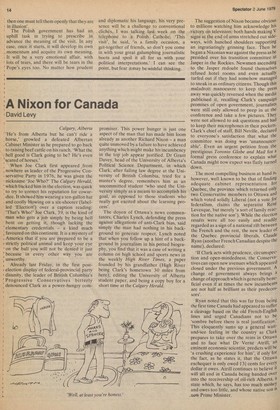'A Nixon for Canada
David Levy
• Calgary, Alberta “He's from Alberta but he can't ride a , horse,' growled a defeated Albertan . Cabinet Minister as he prepared to go back • to raising beef cattle on his ranch. 'What the • hell good is Clark going to be? He's even 'scared of horses.'
, When Joe Clark first appeared , from , nowhere as leader of the Progressive Con. servative Party in 1976, he was given the nickname `Joe Who?' The Calgary Herald, 'which backed him in the election, was quick : to try to correct his reputation for cowar dice. It showed him wearing a ten-gallon hat and coolly blowing on a six-shooter (labelled 'Election') over a caption reading: 'That's Who!' Joe Clark, 39, is the kind of man who gets a job simply by being hell bent on getting it, though lacking the elementary credentials — a kind much , favoured on this continent. It is a mystery of , America that if you are prepared to be a • strictly political animal and keep your eye • on the ball you will not be denied it just ' because in every other way you are , unworthy.
, Already last Friday, in the first post. election display of federal-provincial party disunity, the leader of British Columbia's 'Progressive Conservatives bitterly denounced Clark as a power-hungry corn promiser. This power hunger is just one aspect of the man that has made him loom already as another Richard Nixon — a man quite unmoved by a failure to have achieved anything which might make his incumbency in the top job appear justified. Dr Grant Davey, head of the University of Alberta's Political Science Department, in which Clark, after failing law degree at the University of British Columbia, tried for a master's degree, remembers him as an uncommitted student 'who used the University simply as a means to accomplish his goal, as opposed to those students who really got excited about the learning process'.
The doyen of Ottawa's news commentators, Charles Lynch, defending the press against allegations of anti-Clark bias, said simply the man had nothing in his background to generate respect. Lynch noted that when you follow up a hint of a background in journalism in his potted biography, you find that it was a case of writing a column on high school and sports news in the weekly High River Times, a paper founded by his grandfather (High River being Clark's hometown 30 miles from here), editing the University of Alberta student paper, and being a copy boy for a short time at the Calgary Herald. The suggestion of Nixon became obvious to millions watching him acknowledge his victory on television: both hands making V signs at the end of arms stretched out side ways, with hunched shoulders supporting an ingratiatingly grinning face. Then he began a Nixonian war against the press as he presided over his transition committee at Jasper in the Rockies. Newsmen ascending to the Jasper redoubt found themselves refused hotel rooms and even actuallY turfed out if they had somehow managed to sneak in as ordinary citizens. Though this maladroit manoeuvre to keep the press away was quickly reversed when the media publicised it, recalling Clark's campaign promises of open government, journalists were still only allowed to peep in at the conference and take a few pictures. They were not allowed to ask questions and had to keep their microphones in their pockets. Clark's chief of staff, Bill Neville, declared to everyone's satisfaction that what the committee was doing was 'unannounceable'. Even an urgent petition from the prestigious Toronto Globe and Mail for a formal press conference to explain what Canada might now expect was flatly turned down.
The most compelling business at hand is, however, well known to be that of finding adequate cabinet representation for Quebec, the province which returned onlY two Conservative members to Ottawa and which voted solidly Liberal (not a vote for, federalism, claims the separatist Rene Levesque, but merely 'a sort of family reaction for the native son'). While the election results were all too easily and readily regarded as a sign of a national rift between the French and the rest, the new leader of the Quebec provincial liberals, Claude Ryan (another French Canadian despite the name), declared: 'If Clark acts with prudence, circumspection and open-mindedness, the Conservatives can open new avenues which appeared closed under the previous government. A change of government always brings a change of approach which is generally beneficial even if at times the new incumbents are not half as brilliant as their predecessors'.
Ryan noted that this was far from being the first time Canada had appeared to suffer a cleavage based on the old French-Englisb lines and urged Canadians not to be 'sombre before there is real justification. This eloquently sums up a general wattand-see feeling in the country as Clark prepares to take over the reins in Ottawa and to face what Dr Verne Atrill, an eminent economic scientist, predicts will be 'a crushing experience for him', if only for the fact, as he states it, that the Ottawa exchequer is only owed 13 cents for everY dollar it owes. Atrill continues to believe it will all end in Canada being handed over into the receivership of oil-rich Alberta, a state which, he says, has too much moneY and owes too little, and whose native son Is _no* Prime Minister.






































 Previous page
Previous page